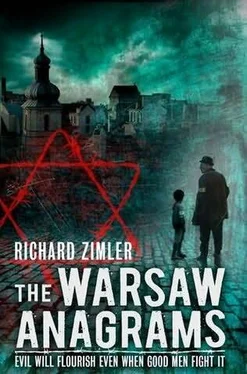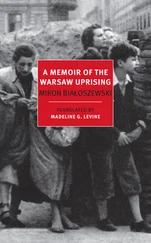Izzy sat in the last pew. I stood just to the side of the main door. I put down my briefcase and held my knife behind my back.
At a quarter past one, Lanik stepped inside. I hadn’t expected him to be in uniform. That troubled me – it was as if he now had an unfair advantage.
He took off his cap and brushed his hair off his forehead with abrupt, irritated flicks. He obviously thought it a burden to have had to travel so far from his office.
He had an intelligent face and large dark eyes. Stepping to the end of the centre aisle, he surveyed the pews.
Izzy turned to face him and stood up, just as we’d agreed. I crept left, towards the entrance, so that the German’s back was to me. The dark moistness of the cathedral seemed to enter me, as if I were becoming a shadow – and as if my change of form was meant to protect me.
I was squeezing the handle of my knife so hard that my hand ached.
‘Are you Dr Lanik?’ Izzy asked.
I remember his eager tone of voice – as if he had pleasant business with the Nazi. Izzy proved himself an extraordinary human being that day.
‘Yes, did Mikael Tengmann send you?’ Lanik replied.
I rushed forward in what I remember as a mad charge, but in truth, I must have been too slow; before I reached the German, he turned to face me. I’d intended to lunge at him and thrust the blade into his back while Izzy spoke to him, but that was impossible now. Instead, I jabbed the knife into his throat, so hard and deep that my fist pounded against the taut firmness of his neck.
Blood sprayed on to my face. I tasted the salty wetness of him on my lips.
He fell back on to the floor, hard, his head knocking into a pew. His cap went flying. I heard myself gasp.
Did the sisters in the front pew turn towards us? Did the balding man stop praying? I’ll never know; I never took my eyes from Lanik.
With desperate hands, he reached up and yanked the knife out of his flesh. If he was able to think at all, he must have been puzzled as to why Mikael Tengmann would send a killer after him.
Blood seeped from his wound. I’d been unlucky; I’d failed to hit an artery. He’d die slowly. Or if help came, he might even outlive Izzy and me.
Lanik looked at me imploringly as he tried to speak, making gurgling noises – as if a knot were lodged in his throat. He fought to sit up, pulling on the back of the last pew, and after he’d managed this feat, his eyes pleaded for mercy. ‘ Hilfe! ’ he mouthed in desperate German. Help me!
Was he thinking he might never see Irene and his wife again?
I was stunned by how much life we have inside our bodies.
I knew it was now I should speak Adam’s name, but I couldn’t talk – proof that you can never predict how you will behave when you stand before the tower of vengeance you have erected.
Izzy retrieved my knife, which was streaked with blood.
‘He might not die,’ I whispered to him. Hearing my own voice made me shiver, and my hand clutching his arm was my request for help.
‘Don’t worry, Erik,’ he replied.
How could he speak so calmly? I never asked him, though once he told me he had never felt more alive than when he stood over Lanik and realized what he had to do.
Sometimes I think that Izzy was the strongest person I ever met.
Kneeling down, he told the German, ‘There was a beautiful boy named Adam, and he had birthmarks behind his ankle.’
He spoke sweetly and slowly – as if his words were the beginning of a children’s story that Lanik still had time to read.
The Nazi shook his head as if he knew nothing about my nephew.
Was it his denial that incensed Izzy? He grabbed Lanik by the hair and smashed his head against the floor.
I cringed on hearing the cruel thud – like two billiard balls knocking together.
The German groaned, and blood spilled over his lips, as though he were vomiting his last chance for life.
Leaning down, Izzy spoke into Lanik’s ear: ‘Adam and Anna say hello.’
And then, using both hands, he planted the blade as deeply as he could in the Nazi’s chest.
In the weeks to come, I would often wonder how I could have known Izzy nearly all my life and never suspected how good he would be at murder.
A black Mercedes was parked outside the church, obviously waiting for Lanik to return. A dark-uniformed chauffeur was inside, reading a newspaper spread into wings. Remembering Schrei’s advice, we didn’t run. We walked east. I never looked back.
Izzy carried my briefcase; I’d left it behind and he’d gone back for it.
Rain splattered around us but didn’t feel wet against my skin. Its relentless pounding seemed the world’s way of insisting on a justification from me for my very life.
Izzy opened our umbrella and summoned me to him, but I needed to be by myself. I was listening for a policeman’s voice to call out to us in Polish or German and demand we stop. I would have turned round and begged to be shot on the spot.
The voice never came.
I remember passing railroad lines. Did we zigzag along sidestreets to keep from being seen? What happened to my bloodstained overcoat? I can’t recall, but I must have left it inside the church; I remember being chilled and noticing at some point that I no longer felt the protection of my muffler around my neck.
I was lost inside the labyrinth of ending a man’s life. When we passed a bus stop, I considered waiting there for the Germans to find me, not out of guilt, but because I couldn’t see how I’d ever find my way back to the person I’d been. Or why I’d want to.
Then, my heart seemed to leap in my chest, and the rain became wet, and I saw Izzy looking back at me with worried eyes, and I began walking purposefully behind him, towards the horizon, which was where freedom was waiting for us. It was as if a hand had tugged me back to my own hopes – my daughter’s hand, as it turned out; I realized I still had a chance to live out the rest of my life with her.
I don’t know how far we walked. I next remember Izzy pointing to a brick building on the left. It was a grimy hotel, with dead geraniums in ceramic windowboxes.
‘We’ll call Jaśmin from in there,’ he told me.
Izzy left our umbrella at the door. I took Jaśmin’s phone number from my wallet. The owner of the hotel was standing behind the counter of a wooden bar, polishing glasses with a tea towel. When I explained what I needed, he lifted out a black phone and put it on the counter.
‘Where are you boys from?’ he asked us as I sat down on a bar stool.
‘Muranów,’ answered Izzy, drying his hands on his trousers. ‘We’re on our way to a wedding, but we got a little lost.’ Izzy smiled and shrugged as people do to excuse their frailties. ‘I rarely come to this side of the river.’
‘How’ bout a little drop of something to take the bite out of the cold weather?’ the man asked, slapping his cloth over his left shoulder.
‘Two vodkas,’ Izzy replied.
I picked up the receiver and began to dial. Our host was pouring our drinks when Jaśmin answered. Thank God she’d returned home.
‘It’s me,’ I told her, unwilling to let the hotel owner overhear my name.
‘You who?’ she asked.
That had me stumped. ‘Stefa’s uncle,’ I finally told her.
‘Dr Cohen? Oh, my God! I thought I’d never hear your voice again.’
‘We’re lost,’ I told her. ‘We’re outside Praga, but I’m not sure where.’
Izzy took the phone and described our location. ‘Listen, baby,’ he added casually, ‘can you pick us up in your car and drive us to the wedding?’
After a moment, he nodded towards me to let me know that Jaśmin had agreed.
‘Meet us down the street,’ Izzy told her. ‘We’ll be waiting under a blue umbrella.’
Читать дальше












